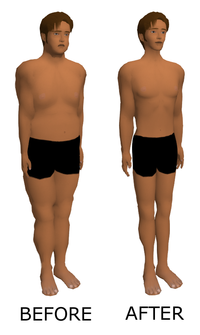
Photo from wikipedia
Objective:We and others have previously characterized changes in circulating metabolite levels following diet-induced weight loss. Our aim was to investigate whether baseline metabolite levels and weight-loss-induced changes in these are… Click to show full abstract
Objective:We and others have previously characterized changes in circulating metabolite levels following diet-induced weight loss. Our aim was to investigate whether baseline metabolite levels and weight-loss-induced changes in these are predictive of or associated with changes in body mass index (BMI) and metabolic risk traits.Methods:Serum metabolites were analyzed with gas and liquid chromatography/mass spectrometry in 91 obese individuals at baseline and after participating in a 1 year non-surgical weight loss program.ResultsA total of 137 metabolites were identified and semi-quantified at baseline (BMI 42.7±5.8, mean±s.d.) and at follow-up (BMI 36.3±6.6). Weight-loss-induced modification was observed for levels of 57 metabolites in individuals with ⩾10% weight loss. Lower baseline levels of xylitol was predictive of a greater decrease in BMI (β=0.06, P<0.01) and ⩾10% weight loss (odds ratio (OR)=0.2, confidence interval (CI)=0.07–0.7, P=0.01). Decreases in levels of isoleucine, leucine, valine and tyrosine were associated with decrease in BMI (β>0.1, P<0.05) and ⩾10% weight loss (isoleucine: OR=0.08, CI=0.01–0.3, leucine: OR=0.1, CI=0.01–0.6, valine: OR=0.1, CI=0.02–0.5, tyrosine: OR=0.1, CI=0.03–0.6, P<0.02).Conclusions:Diet-induced weight loss leads to mainly reduced levels of metabolites that are elevated in obese insulin resistant individuals. We identified multiple new associations with metabolic risk factors and validated several previous findings related to weight loss-mediated metabolite changes. Levels of specific metabolites, such as xylitol, may be predictive of the response to non-surgical weight loss already at baseline.
Journal Title: International Journal of Obesity
Year Published: 2017
Link to full text (if available)
Share on Social Media: Sign Up to like & get
recommendations!